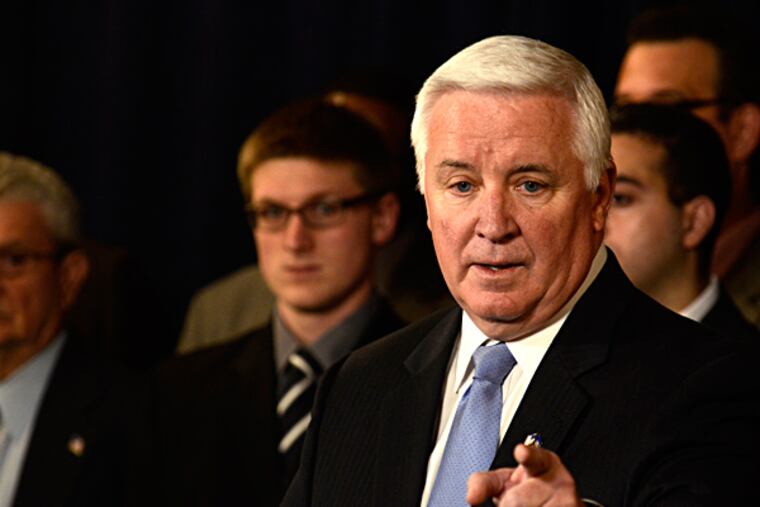Corbett sues NCAA for Penn State sanctions
STATE COLLEGE, Pa. - Gov. Corbett filed a federal suit Wednesday against the NCAA for what he called "overreaching and unlawful sanctions" placed on Pennsylvania State University in the wake of the Jerry Sandusky sex-abuse case.

STATE COLLEGE, Pa. - Gov. Corbett filed a federal suit Wednesday against the NCAA for what he called "overreaching and unlawful sanctions" placed on Pennsylvania State University in the wake of the Jerry Sandusky sex-abuse case.
Flanked by 40 supporters, including former Penn State football players, student and business leaders, and lawmakers, Corbett at a news conference said the punishments "threaten to have a devastating, long-lasting, and irreparable effect on the state, its citizens and its economy."
The suit called the penalties a "capricious and arbitrary" use of its enforcement power done with the intention of "crippling" Penn State football, which generated $50 million in 2010-11.
The 43-page complaint alleges that college sports' governing body seized on the publicity of the Sandusky case "to make a showing of aggressive discipline on the backs of the citizens of the commonwealth."
"These sanctions did not punish Sandusky or the others who were criminally charged," Corbett said. "They punished past, present, and future students."
The NCAA said the suit was "without merit" and called it a setback to the university's efforts to restore its reputation.
"It is an affront to all of the victims in this tragedy - lives that were destroyed by the criminal actions of Jerry Sandusky," said Donald M. Remy, the NCAA's executive vice president and general counsel. "While the innocence that was stolen can never be restored, Penn State has accepted the consequences for its role and the role of its employees and is moving forward."
The university, in a statement issued after the news conference, did not reference the lawsuit, saying only that it would abide by the terms of the consent decree it entered into with the NCAA.
The suit represented a change of heart by Corbett on the sanctions.
At the time the NCAA announced the penalties in July, Corbett, a member of the Penn State board of trustees, said he was grateful the NCAA did not issue even tougher sanctions. He added that "part of the corrective process is to accept the serious penalties imposed today."
Asked about that change of position, Corbett's spokesman, Kevin Harley, said Corbett came to believe the NCAA had overstepped its bounds and had not followed its bylaws, which limited sanctions to infractions relating to recruitment, academics, and football.
"Gov. Corbett issued the statement the day sanctions came out, and, as he learned in this process, the NCAA did not follow their own rules," Harley said. "His initial thinking was that members have to abide by their rules, but as he looked into this he found did not follow their own bylaws. There was no violation involving recruitment or academics or football activity."
The penalties in question include a $60 million fine directed to child abuse prevention, a four-year bowl game ban, and a four-year reduction of the number of football scholarships offered by the school. The NCAA also eliminated years of winning seasons for the university's role in covering up the Sandusky case. The former Penn State assistant coach was sentenced in August to 30 to 60 years for abusing 10 boys.
Corbett defended his decision to bring the suit six months after the NCAA issued its sanctions, saying he wanted to conduct thorough legal research first and did not want to disrupt the football season.
He said he would hire the law firm Cozen O'Connor to handle the case because of the attorney general's workload in the ongoing Sandusky prosecutions. He did not indicate how much he expected the case to cost or how the costs would be covered.
Corbett's chief counsel, James Schultz, said that newly elected Attorney General Kathleen Kane had not yet been briefed on the suit but that he would speak to her after the news conference.
For her part, Kane said in a statement, "As I was not consulted or briefed beforehand on the commonwealth's action against the NCAA, I must reserve comment until I have had an opportunity to review the case filing and receive a full briefing on the matter."
It was unclear exactly to what extent the football sanctions have directly harmed area hotels, restaurants, and shops, but local and state business leaders said they saw a decline in business this fall that they attribute to the NCAA actions.
"When the NCAA imposes sanctions, you have to realize it has an impact on the business community," said Gene Barr, president of the Pennsylvania Chamber of Commerce, who stood with Corbett at the news conference.
Michael Desmond, a State College business owner who also was at the news conference, said his seven restaurants were doing 10 percent less business on football weekends, and, with sanctions in place until 2016, he is concerned about the impact in coming seasons.